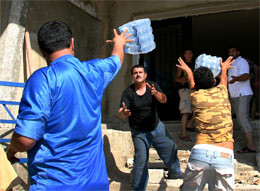Electronic Lebanon 11 July 2007

Aid agencies have struggled to access Nahr al-Bared camp to provide relief to the civilians still inside. (Hugh Macleod/IRIN)
Witnesses said the army was preparing a final assault on the Fatah al-Islam militants holed up inside.
ICRC spokeswoman Virginia de la Guardia said between 140 and 150 people, mostly men, had left the camp during a lull in fighting early in the day. By afternoon, the army had resumed heavy bombardment of positions suspected to be held by the al-Qaeda-inspired Islamist militants.
Dr. Abdel Aziz of the Safad hospital in Baddawi camp, 10km from Nahr al-Bared and home to most of those displaced by the conflict, said fewer than a dozen of today’s evacuees had arrived in Baddawi, with the remainder taken by the army to one of its nearby bases.
Abu Imad, of the Palestinian Popular Committee, spoke to IRIN from inside the Nahr al-Bared today. He estimated as many as 1,500 people still remained in the camp, many of them women and children. Previous estimates had put the number of civilians remaining at 400. There are no official figures of the numbers remaining.
“There are people leaving now, as yesterday the army hit five underground shelters. No civilians were killed but they are worried the army is going to destroy the whole camp now,” said Abu Imad.
“Very, very grave” humanitarian situation
Abu Imad described the humanitarian situation in the camp as “very, very grave” with lack of food, water and medicine and with dead bodies rotting in the streets.
The ICRC has been unable to deliver any food, water or medicine into Nahr al-Bared since 22 June because the army is refusing to grant safe passage.
“Not allowing the supplies through is a mass punishment for all the civilians inside here,” said Abu Imad. “If there is not an immediate ceasefire we are afraid the army will destroy the camp and we will all die in here.”
Army advance
Mazen Fakih, leader of the Civil Defence team that has been evacuating injured soldiers throughout the conflict, told IRIN the army had advanced through the new camp of Nahr al-Bared to within 100 metres of the official boundary of the old camp.
Under a 1969 Arab agreement — to which the army has stuck despite parliament annulling it in the mid 1980s — Lebanese security forces are barred from entering Palestinian camps. However, the leaders of the mainstream Fatah in Lebanon and the occupied Palestinian territories have given the army a green light to enter the official Nahr al-Bared camp.
“Everyone is getting prepared and tensions are extremely high,” said Fakih by telephone as explosions rang out in the late afternoon. “The officers are waiting for their orders to advance.”
The army has issued statements throughout the seven-week conflict — triggered when Fatah al-Islam militants killed soldiers at checkpoints around the camp in retaliation for the arrest of some of their members in nearby Tripoli — saying it does not target civilians.
More than 200 people have died in Lebanon’s worst internal violence since the 1975-1990 civil war. The latest victim, a Lebanese soldier, was killed by sniper fire from inside the camp yesterday.
This item comes to you via IRIN, a UN humanitarian news and information service, but may not necessarily reflect the views of the United Nations or its agencies. All IRIN material may be reposted or reprinted free-of-charge; refer to the copyright page for conditions of use. IRIN is a project of the UN Office for the Coordination of Humanitarian Affairs.
Related Links


